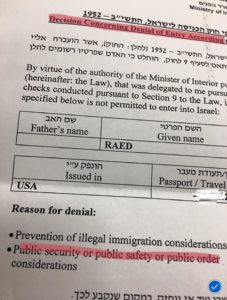Israeli border authorities on Monday denied entry to Raed Jarrar, an American citizen and the advocacy director for the Middle East and North Africa at Amnesty International USA. Jarrar was on his way to be with family and grieve the recent death of his father, but was instead turned back to Jordan, as Israeli authorities refused to allow him entry.
In a statement released by Amnesty condemning the denial, the group said Jarrar’s refusal was a “retaliation against the organization’s human rights work.”
Meanwhile, Israel’s Foreign Ministry told local media that Jarrar, whose family is originally Palestinian, was denied on a personal basis due to his alleged “BDS activities,” referring to the Boycott Divest and Sanctions movement.
In September, Amnesty International became the first organization that Israel said it would strip of its tax exempt status due to the group’s support of boycotting settlement products.
Philip Luther, Research and advocacy director for the Middle East and North Africa at Amnesty International, said the fact that Jarrar was barred entry after being interrogated about his work at Amnesty “appears to suggest that this move was taken in retaliation for the organization’s work on human rights violations” in the occupied Palestinian territory.
“This appears to be another ominous signal of the Israeli authorities’ resolve to silence human rights organizations and activists who are critical of the Israeli government. It flies in the face of the government’s repeated claims that Israel is a tolerant state, respectful of human rights,” Luther said.

” I was on a personal trip with Alli, hoping to visit my dad’s extended family and grieve with them in the wake of his passing,” Raed Jarrar wrote on social media when posting this image. (Photo: Raed Jarrar/Facebook)
Jarrar posted a document on Twitter that was handed to him by Israeli authorities as reason for his denial at the King Hussein Bridge (Allenby Bridge) crossing between Jordan and the Israeli-occupied West Bank.
Under “Reason for denial,” Israeli authorities listed “Prevention of illegal immigration,” and “public security or public safety or public order considerations” in two bullet points.
“That moment when working for @amnestyusa is a threat to ‘public security.’ Also, the irony of denying a Palestinian as ‘illegal immigration,’” Jarrar posted on Twitter with a partial photo of the document. Jarrar’s father was born and raised in Palestine.
Questioned along with Jarrar, Alli McCracken, the North America Campaigner for Amnesty International, also posted on Twitter following the incident:
“Today Israeli authorities denied @raedjarrar entry into #Palestine. We were going to visit his extended family, to grieve the loss of his father. After extensive questioning of Raed about Amnesty International’s project calling for the ban of Israeli settlement goods and intrusive questions about the content of my cell phone (yes, they took it from me), they abruptly deported us to Jordan. It’s a very sad day when an Amnesty International staffer can’t travel to #Palestine to be with family during a personal grieving time,” McCracken said in a string of posts.
McCracken was not denied entry, but chose to turn back to Jordan in solidarity with Jarrar. According to Amnesty, McCracken, who has no Palestinian roots, had been to the occupied West Bank six times previously and “has taken part in solidarity events such as the annual olive harvest.”
In March, Israel amended its Entry to Israel Law, allowing Israeli authorities to deny entry to any foreign national advocating for the BDS of Israeli goods.
It was not the first time Israeli legislation sought to punish those calling for BDS. In 2011, Israeli passed the Anti-Boycott law, making it illegal for Israeli individuals and institutions to call for the boycott of Israeli institutions or companies as a way to condemn Israel’s occupation of Palestinians or illegal settlement activities.

Raed Jarrar holds a document notifying him that he was prevented from entering Israel. (Alli McCracken/Facebook)
In its statement Amnesty spoke out against both laws, saying they are “contrary to Israel’s obligation to uphold the rights to freedom of expression and to non-discrimination on grounds of political opinion.”
The group also stressed that it “takes no position on boycotts,” but instead “supports the right to advocate for boycotts as a form of advocacy protected by the right to freedom of expression.”
It was not immediately clear whether Jarrar plans to take legal action to challenge his denial. Jarrar could not be immediately reached for comment.
People with Palestinian heritage who do not hold Palestinian or Israeli citizenship or residency are often targets of visa denials and entry refusals by the Israeli government, which controls and has the ability to approve or deny all entry to the occupied West Bank.
Source Article from http://mondoweiss.net/2017/11/amnesty-international-activities/
Related posts:
Views: 0
 RSS Feed
RSS Feed

















 November 2nd, 2017
November 2nd, 2017  Awake Goy
Awake Goy  Posted in
Posted in  Tags:
Tags: 
















